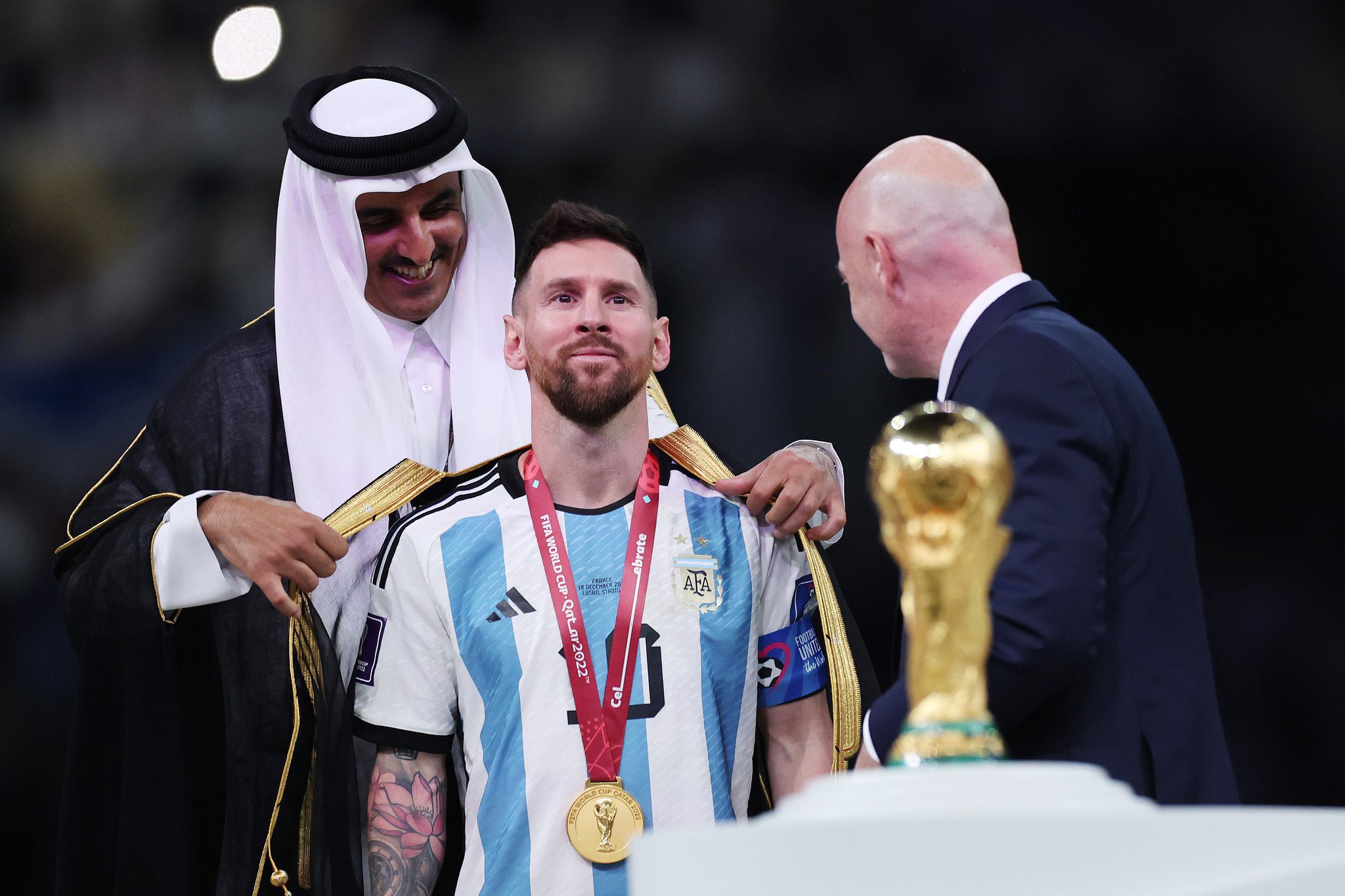Recent smears against the World Cup in Qatar symbolise the final croaks of a dying commoner that still sees himself as king, writes Khaled A. Beydoun.
From the beginning to its stunning end, the World Cup in Qatar has been politicised by western coverage. More salient than the storylines of the footballers taking to the pitch and more striking than the magnitude of the moment to the Middle East, this coverage has shaped the identity of this World Cup in western discourses; and until its final moment, dressed it with bigoted indictments and double standards.
When it was time for Lionel Messi to finally lift up the trophy that long eluded his celebrated career, in the centre of a stadium where one of the greatest World Cup Final matches was played, this coverage took centerstage. Again, one last time to mar a moment that finally crowned Messi a champion and affirmed that Qatar could not only deliver a quality World Cup – but perhaps one of the greatest tournaments in its ninety-two year history.
The final stage of a historic tournament was set. The Amir of Qatar Sheikh Tamim bin Hamad Al Thani wrapped the traditional bisht around Messi, then locked hands with the smiling Argentine as his countrymen and women in the stands sang and cried. It was a sight to be seen, a sublime conclusion to a stirring final and storied month, which I was fortunate to watch from my seat in Lusail Stadium.
The image, of Messi covered and cloaked in the traditional Qatari garment, symbolised union. Even more so, cultural harmony between an Argentinian icon who will always be remembered for cementing his legendary career in Qatar, an Arab and Muslim nation that, like him, was underestimated for its size and stature.
Messi’s victory was Qatar’s victory. And being covered in the bisht was a powerful image, and a potent metaphor that, for the western media outlets that sought to mangle the entire image of the World Cup before its initial kickoff, provided one final opportunity.
The Telegraph ran a story calling it, “the bizarre act that ruined the greatest moment in World Cup history,” while another Australian outlet accused Qatar of “hijacking” Messi of his moment – a particularly derogatory term for Arabs. Former British footballer and fulltime talking head Gary Lineker raged at FIFA for making wear Messi wear “a little robe,” while the Daily Mail’s Ian Herbert wrote that “Qatar claimed Messi” by dressing him with the bisht, calling the nation a “soulless state” for a display associated with honor.
It should come to no surprise that the vast majority of this tirade came from Britain, the faded empire that replaced the spilling of colonised blood with the modern spilling of postcolonial ink. Orientalist bigotry drove British colonialism then, and its ugly residue colours its media coverage over Arab subjects and Muslim objects today – which shrouded this World Cup at its start, its close, and every step and stage in between.
It is not uncommon for state hosts to honor their guests with native ornaments. Particularly during sporting competitions. Whether wreaths worn around heads or leis around necks, local clothing or symbolic dances, the local culture of a host country is routinely infused into the pageantry of sport. Football is no different, and Qatari customs should be no different.
However, unlike Olympics staged in China or World Cups hosted in Europe, Qatar is a nation living in the very marrow of the Middle East, and through dress and identity, embodies Islam. These identities cast it as distinct and demonic, from the vantage point of European and specifically British media perspectives, who cannot help but see the region, its people, and its starkest symbols through the eyes of Orientalism and Islamophobia.
Whether it’s the Hijab worn by a Moroccan student studying at a University in Lyon or a bisht covering the body of an Argentine champion in the middle of Lusail Stadium, Islamic symbols are incessantly scrutinised and explicitly defiled. In arrogant fashion, ignorant voices from the swollen belly of Europe undress these symbols of their genuine meaning, and dress them with stereotypes tied to violence and oppression, “hijacking” and horror.
The hate coming from western Europe seemingly has no end and rises from a deeply rooted arrogance that stilts itself up as superior while looking down at Qataris as they once did colonised peoples across the Arab and African regions. But those eyes are old and fading, and these recent smears against the World Cup in Qatar symbolise the final croaks of a dying commoner that still sees himself as king.
A desperate cry for relevance in a world with its best days far behind it.
As Qatar made history, on the highest stage of sport and culture, and crowned a football king with gold and gown to match, we should look forward and ahead.
And leave the hate and Islamophobia coming from western Europe where it belongs, behind the ugliest pages of history it wrote and behind us.
Khaled A. Beydoun is a law professor at Wayne State University in Detroit and the Berkman Center at Harvard. He is the author of the forthcoming book, The New Crusades: Islamophobia and the Global War on Muslims. You can find him on his socials at @khaledbeydoun.







